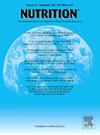出院后的营养支持可降低胃癌术后患者的长期死亡率:一项前瞻性随机试验的二次分析。
IF 3.2
3区 医学
Q2 NUTRITION & DIETETICS
引用次数: 0
摘要
背景和目的:研究发现,出院后的营养支持可改善癌症术后患者的营养状况。然而,这种支持对长期临床结果的影响还存在争议。因此,我们研究了出院后营养支持对胃癌术后患者长期临床预后的影响:这是对接受胃癌手术并被纳入随机对照试验的营养风险患者进行的二次分析。干预组接受口服营养补充剂和饮食建议,对照组仅接受饮食建议。对两组患者的长期死亡率(主要结果)和其他临床结果进行了比较:共有 321 名患者参与了此次分析,中位随访时间为 60.5 个月。根据《2002 年营养风险筛查》(NRS 2002),发现营养风险是死亡的重要预测因素。即使在对年龄、性别、合并症和美国癌症联合委员会分期进行调整后,这种关联仍然是独立的。NRS 每增加一个点,调整后的死亡率危险比就增加 1.30(95% 置信区间 [CI] 1.05-1.60,P = 0.016)。在随访期间,干预组共有 64 名患者(39.5%)死亡,对照组共有 81 名患者(50.9%)死亡。因此,两组之间的调整后死亡率危险比为 0.69(95% CI 0.50-0.96,P = 0.026)。交互检验结果显示,不同年龄、性别、合并症、NRS 和美国癌症联合委员会分期亚组之间的死亡率差异无统计学意义。除其他功能结果外,出院后的营养支持还能显著改善手握力(调整系数5.05,95% CI 3.01-7.08,P = 0.000):出院后的营养支持降低了胃癌术后营养风险患者的长期死亡率,并改善了他们的手握力。目前的调查为癌症管理指南中关于手术后患者出院后营养支持的建议提供了证据。本文章由计算机程序翻译,如有差异,请以英文原文为准。
Nutritional support after hospital discharge reduces long-term mortality in patients after gastric cancer surgery: Secondary analysis of a prospective randomized trial
Background and aims
Nutritional support after hospital discharge was found to enhance the nutritional condition of patients after cancer surgery. However, the effect of such support on long-term clinical outcomes is controversial. We thus investigated the effect of nutritional support after hospital discharge on long-term clinical outcomes in patients after gastric cancer surgery.
Methods
This was a secondary analysis on individuals at nutritional risk who underwent gastric cancer surgery and were included in a randomized controlled trial. The intervention group received oral nutritional supplements combined with dietary advice, and the control group received dietary advice alone. The long-term mortality (primary outcome) and other clinical outcomes were compared between the groups.
Results
In total, 321 patients were included in this analysis, with a median follow-up duration of 60.5 months. According to the Nutritional Risk Screening 2002 (NRS 2002), the presence of nutritional risk was found to be a significant predictor of death. This association remained independent even after adjusting for age, sex, comorbidity, and American Joint Committee on Cancer stage. The adjusted hazard ratio for mortality increased by 1.30 (95% confidence interval [CI] 1.05–1.60, P = 0.016) for each additional point rise in NRS. During the follow-up, a total of 64 individuals (39.5%) in the intervention group and 81 patients (50.9%) in the control group died. Consequently, the adjusted hazard ratio for mortality between the two groups was 0.69 (95% CI 0.50–0.96, P = 0.026). The results of interaction tests did not yield statistically significant variations in fatality rates across the age, sex, comorbidity, NRS, and American Joint Committee on Cancer stage subgroups. Nutritional support after hospital discharge significantly improved handgrip strength (adjusted coefficient 5.05, 95% CI 3.01–7.08, P = 0.000) in addition to other functional outcomes.
Conclusions
Nutritional support after hospital discharge reduced long-term mortality and improved handgrip strength among patients at nutritional risk after gastric cancer surgery. The current investigation provides evidence for the recommendation of nutritional support, for post-surgery patients after hospital discharge, in cancer management guidelines.
求助全文
通过发布文献求助,成功后即可免费获取论文全文。
去求助
来源期刊

Nutrition
医学-营养学
CiteScore
7.80
自引率
2.30%
发文量
300
审稿时长
60 days
期刊介绍:
Nutrition has an open access mirror journal Nutrition: X, sharing the same aims and scope, editorial team, submission system and rigorous peer review.
Founded by Michael M. Meguid in the early 1980''s, Nutrition presents advances in nutrition research and science, informs its readers on new and advancing technologies and data in clinical nutrition practice, encourages the application of outcomes research and meta-analyses to problems in patient-related nutrition; and seeks to help clarify and set the research, policy and practice agenda for nutrition science to enhance human well-being in the years ahead.
 求助内容:
求助内容: 应助结果提醒方式:
应助结果提醒方式:


